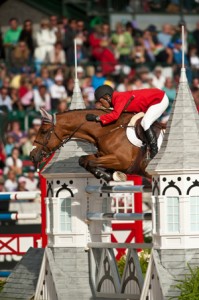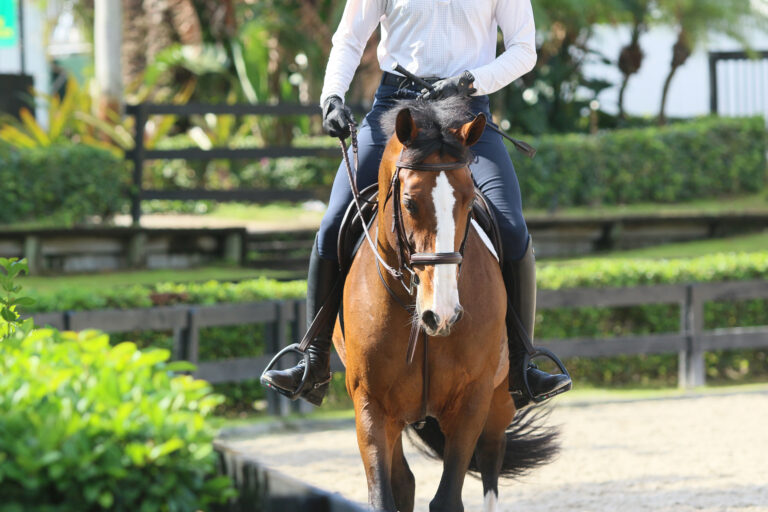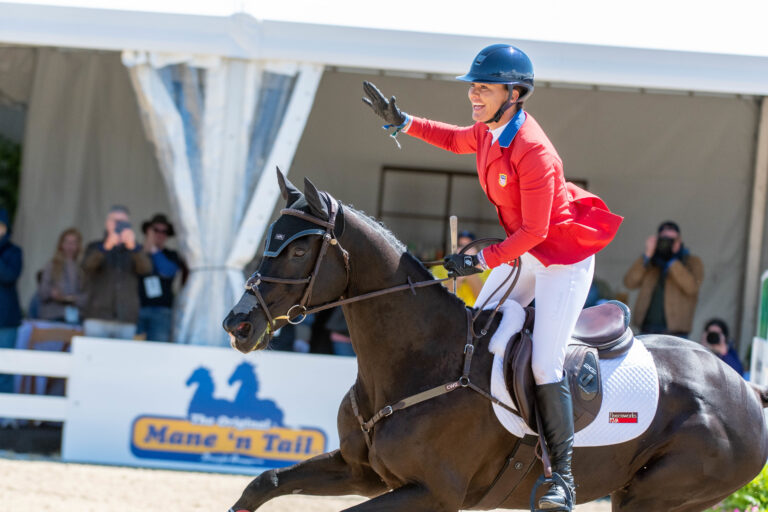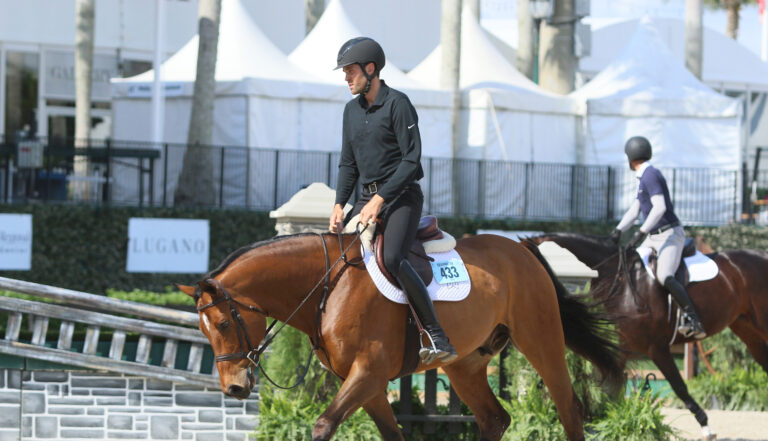Show jumper Pablo Barrios has competed in one Olympic Games, two Pan American Games, three World Equestrian Games, and four Central American and Caribbean Games over the last three decades, in some cases as the sole representative of his native country, Venezuela. Despite all this international experience, most people (including show jumper Pablo Barrios, himself) considered him a perennial underdog?until recently. Thanks to a partnership with his childhood friend, Gustavo Mirabal, Pablo Barrios is beginning to hold his own among the best riders in the world at age 47.
 In 2010, Pablo Barrios and G&C LaGran anchored the first Venezuelan team to compete at the World Equestrian Games.
In 2010, Pablo Barrios and G&C LaGran anchored the first Venezuelan team to compete at the World Equestrian Games.Gustavo Mirabel and Pablo Barrios met when they were about 10, learning to ride at a country club where their parents were members. Show jumping was not a popular sport in Venezuela then?and still isn’t today. “The traditional sports are baseball and basketball. There’s some horse racing, too, but no tradition of jumping,” says Gustavo Mirabel.
The boys’ group riding lessons taught only the most basic equitation and ring skills. Even so, Pablo’s riding acumen thrived. “He was very talented since he was a kid,” says Gustavo. “He always beat all of us in the classes.” Natural athleticism, combined with a strong competitive nature, make Pablo a force to be reckoned with in any sport, says his wife, Joaquina, who adds, “He doesn’t like to lose.”
Pablo learned early on that to pursue his new love of jumping he’d have to work hard to seek good instruction, which usually came in the form of visiting foreign clinicians. As a teenager, he trained with several Argentine riders, as well as renowned Californian jumper and coach Robert Gage. “I was fortunate to ride with Robert,” says Pablo. “He is one of the best trainers we ever had in Venezuela.”
New Country, New Business
Pablo and Gustavo lost touch with one another when they gave up horses to train for their chosen professions. The latter became a lawyer before pursuing a successful career in banking and insurance, and the former became an architect. In 1994, though, after 10 years of architecture, Pablo received a rare ?offer to train horses professionally and decided riding was his true calling. Once again, he sought expert help, this time by traveling to the United States and Canada to train with Canadian Olympian Pierre Jolicoeur for six months.
Pablo’s new sponsor, Ramon Ramirez, bought nice horses and sent Pablo to his first international competitions as a professional rider. After several years of support, however, Ramon ?decided to concentrate on his business and sold his horses.
Undaunted, Pablo and another partner, Juan Felipe Lara, started a private training business?the first one in Venezuela open to non-country club members. With Joaquina managing the barn and interacting with customers (a role she maintains today), they built a substantial clientele, teaching students, training horses and traveling to the States to sell one or two horses a year.
Meanwhile, Venezuela was experiencing a period of economic and political turmoil. The oil glut of the 1980s led to soaring inflation and poverty rates?the latter reached 66 percent in 1995?and a national debt crisis. By 2001, the failing economic and political situation forced Pablo and Joaquina to consider emigrating. Joaquina’s US citizenship?she was born in New York?and their previous good experiences in the States made the decision easier. The three-hour flight from Venezuela to Florida would also keep them close to family, particularly Pablo’s son from his first marriage. (He and Joaquina now have three more sons.)
The timing was good for Pablo’s riding career, too, he says. “I was a little stuck in Venezuela and wanted more competition, wanted to become more of a rider.” He chose a place where he could watch and ride with some of the best in the world: Wellington.
The next stage of Pablo’s career was a typical hard-working American success story. “We started building little by little,” Joaquina says, recalling their early years in Florida. “We rented a place and bought a couple horses and he managed to sell them. And then we bought a little house. And from that, we bought the barn.”
Meanwhile, Pablo absorbed all he could from the riders around him. “Watching the top riders, you can see that everything is about control,” he says. He admired the perfectionism of US Olympians Laura Kraut, Beezie Madden, Lauren Hough and, especially, McLain Ward. “McLain is the most perfectionist of all of them. He’s methodical. He always has a plan and makes a perfect execution of it. That’s why he is where he is.”
To emulate these ideals, Pablo learned to emphasize flatwork. “That’s the key to getting as much control as possible. You get that when you have the horses very obedient and well prepared on the flat.” He taught his own students “that the most important thing to understand in the sport is to feel. Feel what’s going on with the horse and create a relationship with him. And be in good balance?so you bother the horse as little as possible.”
Trading Up Talent
Pablo’s hard work toward these goals earned him show-ring success and a string of new clients. But living in a foreign country, Pablo didn’t benefit from the same support network?training sessions, coaching?that most top riders enjoy in their home countries. Accumulating enough points to qualify for international competitions required a great deal of travel and heavy show schedules for his small string of horses. He covered some of these ?expenses himself and, with the help of several financial partners, such as ?Andres and Holly Ana Olivares, “traded up” as ?often as he could, selling and buying ?increasingly talented horses.
By 2008, Pablo owned a pair of top-level grand-prix horses?both now 12 years old?who couldn’t be more different from one another. LaGran is a bay Oldenburg gelding with a beautifully chiseled face and a quirky personality. “He’s 16.3, but he looks smaller because he’s so compact,” Joaquina says. “He’s so flexible, he’s like a rubber ball. He’s quite spooky?but that’s what makes him so careful.”
With characteristic cool demeanor, Pablo has produced remarkable performances from LaGran. “He’s not the most powerful horse to jump the big fences, but he has a wonderful technique to help him clear them,” he explains. “He’s also very fast in the jumpoffs.”
Pablo’s other grand-prix mount at the time, Sinatra, is a very different ride. The big-bodied, 17.2-hand, bay Dutch gelding has such a tremendous stride, it looks as if he’s cantering in slow motion around the show ring. “I have to walk the courses in a totally different way when I’m riding him,” Pablo says. “He can leave out any stride in any line. In a four-and-a-half stride line, he can do four easy.”
Sinatra was only 9 when Pablo rode him in the 2008 Beijing Olympics, placing a respectable 43rd individually. “He is very, very consistent,” says Pablo. “He can do well indoors, outdoors; he can do the derbies and the puissance. I love the horse! And he’s getting better with age.”
Pablo rounded out his string with an exciting Hanoverian gelding, Flash, who is now 9. This chestnut has a big white blaze and a rocking-horse canter, much like Sinatra’s. “He has extraordinary hind legs that kick in the air amazingly,” says Joaquina. “He seems like Pablo?always very quiet, with everything under control.”
The Call That Changed It All
In 2009, Pablo received a call out of the blue from his old friend Gustavo, who was still living in Venezuela. “He said, ?I’ve got some horses, and I want you to ride them. Give me your address because I’m going to send some horses there.'” Gustavo had renewed his interest in horses after being away from them for more than 15 years. He and his wife, Carolina, were now avid amateur jumpers, and their three daughters were catching the bug, too. His successful banking and insurance career provided the means to invest in his beloved sport in a big way.
“I bought my first four horses in Argentina alone,” says Gustavo. Remembering his friend’s talent and disciplined, professional personality, he asked Pablo to ride his horses exclusively. He also offered to buy out the co-owners of Pablo’s three horses. The new endeavor was named G&C Farm, after Gustavo and Carolina, so all of the horses’ names were given the prefix G&C.
Gustavo built a state-of-the-art training facility in Wellington and staffed his new team with the best professionals he could find, many of whom shared his South American roots. He hired world-class course designer Leopoldo Palacios to design the arena footing and Auburn University professor and veterinarian Jorge Gomez to oversee the horses’ health. Gustavo is a strong believer in preventive medicine (custom feeding schedules, daily supplements, massage, magnetic blankets). He says, “It’s kind of an agreement with the horse: I take good care of you, and you give me one hundred percent.”
Next came the fun part: Gustavo and Pablo went horse shopping in Germany and Belgium. On their first trip, the two friends made the fortuitous decision to prolong their stay an extra day. “We were supposed to get on a plane that day,” says Gustavo. “But instead we said, ?Let’s stay and go to this horse show. It was a ?really small indoor show in a little German town.” At the show, a fiery bay Dutch mare named Quick Star 11 caught their attention. An unconventional jumper who traveled with her head up, ears back and lips smacking nervously, she had an ?unmistakable show-ring presence.
“We fell in love with her immediately,” remembers Gustavo. “We knew we had something special in our hands. We saw her in the first round and then immediately talked to the owner. It was very funny. He didn’t speak any Spanish or English?and I didn’t speak any German.” Somehow the men found a way to communicate, and a tentative deal was made before Quick Star (who hadn’t been for sale) went back into the ring for the jumpoff.
Quick Star was a challenge to ride at home, remembers Joaquina. “She was a wild one! Pablo couldn’t even trot her; it would just be walk or canter.”
“But I figured her out,” says Pablo, “and now I do the least possible at home?just enough to maintain her in good shape and fitness. I started using the hackamore for flatwork and then one day I tried jumping her in it, thinking that it would be very hard to control her with it, but she was more comfortable with nothing in her mouth. Since then, I’ve showed her with the hackamore, and she’s gone a lot better.”
Quick Star is happiest in the show ring, says Pablo (although she still smacks her lips, even without the bit in her mouth). “She knows what to do when she’s in there. She’s very high in the schooling area but when she gets to the ring, she gets very focused on what she has to do.”
With G&C Quick Star 11, as she is now called, Pablo anchored the Ven?ezuelan team at the 2010 Central American and Caribbean Games in Puerto ?Rico, where they earned three gold medals. This spring, they competed in the World Cup Finals in Leipzig, Germany, where they finished 17th, just out of the money.
A Support Network
Qualifying for the World Cup Finals?something Pablo had never done before G&C Farm’s creation?was one of his and Gustavo’s initial goals. They also achieved their goal of breaking into the top 30 of the Rolex FEI rider rankings. In the first two years of the partnership, Pablo rose from 93rd to 26th in the world.
In 2010, Pablo and G&C LaGran won the $150,000 Spy Coast World Cup Qualifier at the Winter Equestrian Festival in Wellington. Later that year, they ?anchored the Venezuelan team at the World Equestrian Games in Kentucky?the first time Venezuela fielded a team at WEG. Venezuela finished 20th out of 27 teams, and Pablo and LaGran finished in the top 30 individually. “He had the best time in the speed class,” says Pablo proudly of his horse. “We had one rail down but were two seconds faster than the winner.”
Meanwhile, in 2010 alone, G&C Sinatra won the $175,000 Nexen Cup Derby in Spruce Meadows, Calgary, and two puissance classes, one at the Dublin International Horse Show and the other at the FTI WEF. Pablo picked up two other puissance wins with G&C Quivola, a horse Gustavo normally rides who was only 7 at the time, and G&C Blanchee Z, a talented gray Belgian mare who later succumbed to a neurological disease.
Having more than two grand-prix horses now means Pablo can alternate mounts from show to show, keeping them fresher while still accumulating enough points to stay in the top rankings. His new standing has earned him invitations to elite shows, such as the Global Champions Tour competitions?invaluable opportunities to ride among the best in the world.
Even after decades of riding, Pablo is still learning new things through observation. For example, he’s noticed that top European riders spend more time warming up their horses than their counterparts in the States. But some qualities seem universal among the best riders, he says. “They have great balance, good rhythm and a soft touch. So I just try to do those things!”
To help raise Pablo’s riding to an even higher level, G&C Farm has signed on six-time British Olympian Nick Skelton to coach him at competitions. “He has been a good help,” says Pablo. “He gives me tips to improve my riding and get a little faster.”
After achieving their first goals so quickly, Pablo and Gustavo have set their sights even higher. Their new hope is to qualify a Venezuelan team for the 2012 London Olympics?something Venezuela has never done before?by performing well at October’s 2011 Pan American Games in Guadalajara, Mexico. If that plan falls through, though, Pablo hopes to qualify for the Olympics as an individual. And this time, if Quick Star develops the potential he thinks she possesses, they just might be individual medal contenders.
This article originally appeared in the November 2011 issue of Practical Horseman magazine.











